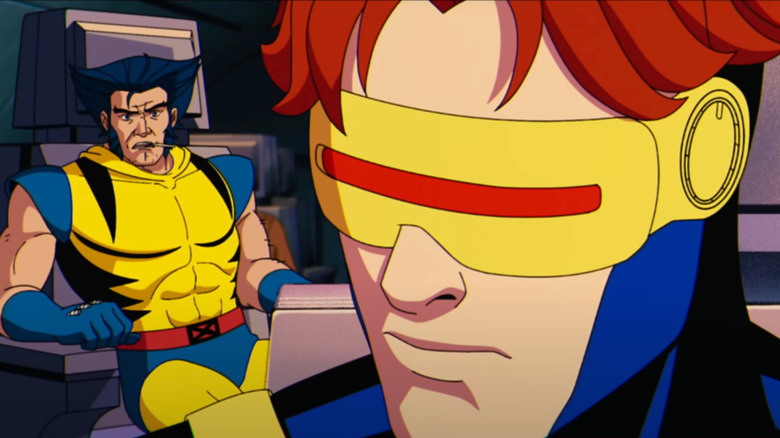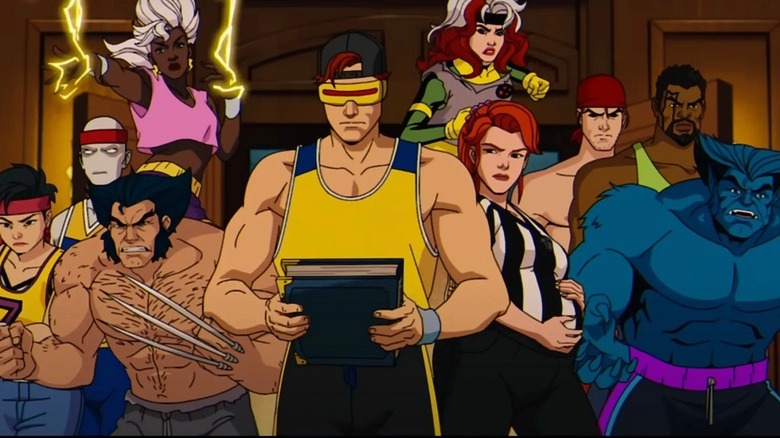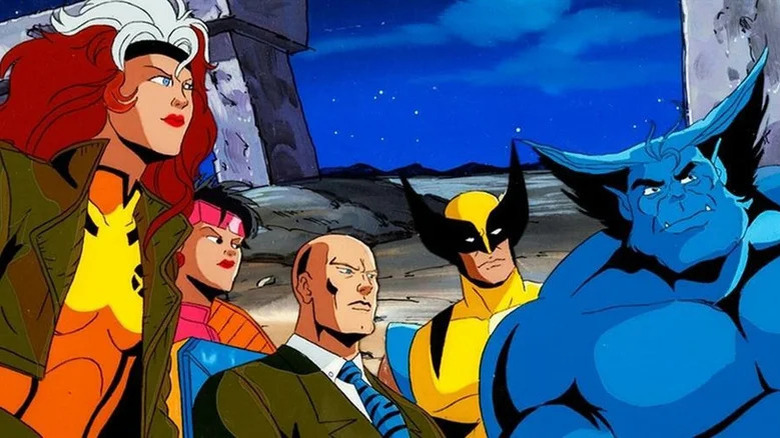X-Men '97 Is Not Part Of The MCU – And That's A Good Thing
The "new" animated series "X-Men '97" is set to debut on Disney+ on March 20, 2024, and, boy howdy is it rolling hard with the nostalgia. "X-Men '97" is a late-stage continuation of the "X-Men" animated series that ran on Fox Kids from 1992 to 1997, a series that was deeply beloved by kids in a very, very specific age bracket. "X-Men" was sometimes shoddily animated and awkwardly scripted, but it did capture the outsize wildness of the X-Men comics on which it was based. The show ran for 76 episodes, ending in September 1997.
True to its name, "X-Men '97" is pretending that the series never left the air, essentially serving as a sixth season to the original show. The new show borrows the character designs from the original series, but updates the animation to look a little sharper and cleaner; I'm guessing that the new show won't have the "disappearing lines," bad acting, or wonky color problems the original had.
Of course, when Disney purchased Fox in 2019, questions arose about what would be done with Disney's Marvel Cinematic Universe. Fox had previously owned the film rights to Marvel's X-Men characters, and the acquisition had superhero fans asking when they might see the X-Men and the Avengers cross paths. To date, there have been a few teases in this regard — Quicksilver, Professor X, and the Beast appeared in various MCU properties, and, of course, there's the upcoming film "Deadpool & Wolverine" — but a full-on X-Men team hasn't yet been seen in the MCU.
Some fans of the 1992 "X-Men" series, then, posited that "X-Men '97" might deliberately fold the famed mutants into the MCU. But according to the Instagram account of the aggressively shirtless series creator Bruce DeMayo, the new series is its own entity.
No, X-Men '97 is not part of the Marvel Cinematic Universe
DeMayo recently opened up a (now closed) Q&A session to fans, and, thanks to Collider, there is a transcription of the exchange. When a fan asked, point blank, if "X-Men '97" would be folded into the extant live-action MCU, DeMayo was blunt, saying: "We are our own thing."
Note that interconnectivity has long been the raison d'être of the Marvel Cinematic Universe. Single chapters/films didn't matter as much as their connection to later chapters/films. Every character introduction was a promise that more of that character would be seen in future movies, and every incomplete plot point was accepted as a setup for a future payoff. Indeed, one might posit that many of the single films in the Marvel Cinematic Universe wouldn't have been worth seeing had they not been directly connected to other films; it's possible that few would have seen Kenneth Branagh's "Thor" back in 2011 if it hadn't already been announced that he was to appear in "The Avengers," due the following year.
Thanks to the TV series "Loki," to "Spider-Man: No Way Home," and to Sam Raimi's "Doctor Strange in the Multiverse of Madness" (the film that featured Patrick Stewart as a live-action version of the animated Professor X from 1992), it's been established that the MCU has near-infinite parallel timelines. Now every version of every hero — regardless of studio ownership — will be able to interact with all of the others.
Some assumed the "infinite timeline" setup of those films would retroactively incorporate the old "X-Men" series into the fold. As it so happens, that is not so. The MCU will continue to contract, and DeMayo will make his own series, unconcerned with its future.
Frankly, this is a good thing.
Let stories stand alone
In attaching itself to a groaning, ever-expanding scaffolding, the MCU has done itself a disservice. The films in the MCU have attempted to do in 15 years and 30-some films what Marvel comics did with hundreds of thousands of comic book pages over the course of at least four decades. In Marvel comics, a reader can easily accept that the universe is altered, an Earth completely changed by the presence of a theogony of new gods. But because the new movies are presented in live-action and the heroes are played by real-life actors, it feels a little bit more like the real world. It's also notable that "Iron Man" introduced heroes into a world where there weren't any yet (at least that we knew of at the time). The unsettling unreality of the MCU only becomes sharper with each passing chapter.
In 2024, it's going to be impossible to tell a story in the MCU without the viewer being deeply familiar with the texture and the events — and all the major players — in the universe. This has made for multiple movies that feel far-removed, less intimate, less human, and less relatable. Now Ant-Man can galavant off to other dimensions, and never give actual human beings a second thought; who are the Avengers even fighting for anymore? Lately, we've rarely seen real-world humans of any significance.
In separating "X-Men '97" from the MCU, viewers may feel relieved that they won't have to take notes. The events of the show can have consequences all their own. Characters can die or make bold sacrifices without having to save themselves for future MCU movies. And the showrunners can tell whatever stories they want without having to consult with the writers of other films and movies, trying to keep track of some dull story unity.
Let it be free.


